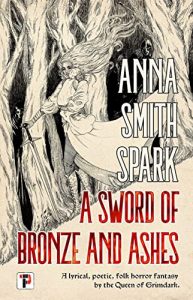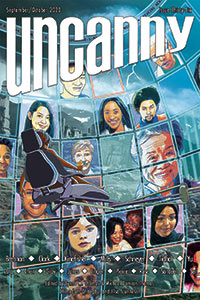Liz Bourke Reviews A Sword of Bronze and Ashes by Anna Smith Spark
 A Sword of Bronze and Ashes, Anna Smith Spark (Flame Tree Press 978-1-78758-839-4, $16.95, 336pp, tp) September 2023.
A Sword of Bronze and Ashes, Anna Smith Spark (Flame Tree Press 978-1-78758-839-4, $16.95, 336pp, tp) September 2023.
I haven’t read Anna Smith Spark’s work before, though I understand her debut, The Court of Broken Knives (2018), received some critical attention. Her latest, A Sword of Bronze and Ashes, is a peculiar, ambitious novel. It deliberately sets out, with its use of language, its use of repetition and of epithets, of motifs and of the poetic devices of sound like alliteration, assonance, and cacophony to recall oral epic poetry. Its settings and its concerns call to mind in particular early medieval Irish and Welsh epic cycles, with their magical dangers and protections, gifts and hazards, suffusing the landscape and stretching back into an unremembered but still powerful past. In its physical groundedness and concern with bodily indignities, it reminds me of the more memorable bits of the Táin.
Kanda has a good life with her farmer husband Dellet and her three daughters: adolescents Sal and Calian, and toddler Morna. Her cows give good creamy milk, her daughters are healthy, her husband is a kind man. A good life, a hard life, an ordinary life.
But Kanda is not an ordinary woman. And the enemies who are about to disturb her peace are no ordinary enemies. The faceless woman, Ysarene, whose name means Hunger; bronze-helmed Geiamnyn, whose name means Burning, and the man without a name, emptiness: they are powers out of legend. They are ruin and destruction, who kill for no other reason than it pleases them.
Long ago and far away, when the world was young, Kanda was a warrior without peer, one of the Six Swords of the Hall of Roven, whose name meant peace. Warriors and poets who did brave deeds and rode out to fight any evil that threatened, who gave aid wherever it was asked for.
That is not all that Kanda was. The Swords of Roven swore an oath. But the oath was broken, and Roven fell.
Now Hunger and Burning and emptiness harry Kanda and her daughters and Dellet, who did not know all of whom he married, across the landscape. Kanda wants to protect her children, but there are truths that Kanda would prefer not to tell them. What parent doesn’t want to shield their child from the world’s cruelties? What parent doesn’t want to protect their child from that parent’s mistakes? (What parent wants to explain all their most painful history to their children, for that matter?) But Calian is very like her mother, and will fight even where Kanda would prefer to retreat; Sal wants to think the best of her mother and will strive to keep her sisters safe, and Morna is very young and very wilful in the way of toddlers pressed far past their emotional equilibrium. (This is not a book to read if you have difficulty with threats to children.)
Kanda loves her daughters and her husband. She does not always like them. (She does not, for that matter, always like herself.) Strong personalities have different opinions about how they should face their pursuers, but Kanda’s daughters lack all the necessary facts. Kanda is struggling with the honesty necessary to provide them.
A Sword of Bronze and Ashes blends the register of myth with the bruisingly quotidian experience of piss and menstruation, shouting toddlers, and cranky adolescents. The contrast between them makes both come into sharper and more painful relief. It’s an ambitious combination.
I’m not sure if A Sword of Bronze and Ashes means to recall Christian themes of the Edenic fall from grace, or Milton’s Paradise Lost, but it does that too. Kanda struggles with what it means to be a good mother, to raise her children, to live in the world. And she struggles with, for lack of a better word, the sins of her past, which have come home in the present.
A Sword of Bronze and Ashes is fascinatingly difficult to categorise. I don’t know if I like it. But it’s interesting, and that might be better.
Liz Bourke is a cranky queer person who reads books. She holds a Ph.D in Classics from Trinity College, Dublin. Her first book, Sleeping With Monsters, a collection of reviews and criticism, is out now from Aqueduct Press. Find her at her blog, her Patreon, or Twitter. She supports the work of the Irish Refugee Council and the Abortion Rights Campaign.
This review and more like it in the November 2023 issue of Locus.
 While you are here, please take a moment to support Locus with a one-time or recurring donation. We rely on reader donations to keep the magazine and site going, and would like to keep the site paywall free, but WE NEED YOUR FINANCIAL SUPPORT to continue quality coverage of the science fiction and fantasy field.
While you are here, please take a moment to support Locus with a one-time or recurring donation. We rely on reader donations to keep the magazine and site going, and would like to keep the site paywall free, but WE NEED YOUR FINANCIAL SUPPORT to continue quality coverage of the science fiction and fantasy field.
©Locus Magazine. Copyrighted material may not be republished without permission of LSFF.







